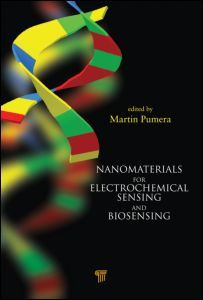Description
Nanomaterials for Electrochemical Sensing and Biosensing
Coordinator: Pumera Martin
Language: English
Subjects for Nanomaterials for Electrochemical Sensing and Biosensing:
Keywords
Microelectrode Arrays; Carbon Nanotubes; Nanomaterial-Based Electrodes; Glucose Biosensor; Nanomaterials as Labels; Electrochemical Detectors; Nanorods for Electrochemical Barcoding; Conducting Polymers; Potenciometric Detection of Bioassays with Quantum Dots Labels; SEM; Carbon Nanotube-Based Electrochemical Sensors and Biosensors; Carbon Ionic Liquid Electrode; Peg Hydrogel; Au Nanoparticles; Electrode Arrays; Electrochemical Biosensors; CdS QDs; AAO Template; DPV; CE Microchip; American Chemical Society; Potentiometric Sensors; Electrocatalytic Hydrogen; Electrochemical Sensors; Tr Od; Electronic Noses; Ion Selective Membrane; Electrochemical Sensing Devices; Human IgG; DNA Hybridization Assay
292 p. · 15.2x22.9 cm · Hardback
Description
/li>Contents
/li>Biography
/li>
Nanotechnology brings new possibilities for the development of sensors, biosensors, and novel electrochemical bioassays. Nanoscale materials have been extensively used in a wide variety of configurations ? as electrode surfaces to promote electrochemical reaction, as "wires" to enzymes connecting their redox centers to electrode surface, as nanobarcodes for biomolecules, or as tags to amplify the signal of a biorecognition event.
Nanomaterial-based electrochemical sensors have been used in many areas, including cancer diagnostics and the detection of infectious organisms. This book reviews important achievements in the field of nanomaterial-based electrochemical sensors and biosensors.
Nanomaterial-Based Electrodes: Carbon Nanotube-Based Electrochemical Sensors and Biosensors. Electrochemistry on Single Carbon Nanotube. Theory of Voltammetry at Nanoparticle-Modified Electrodes. Metal Oxide Nanoparticle-Modified Electrodes. Semiconductor Quantum Dots for Electrochemical Bioanalysis. Nanoparticle-Modified Electrodes for Sensing. Nanomaterials for Electrochemical Gas Sensing. Carbon Nanotube/Room-Temperature Ionic Liquid Electrodes. Carbon Nanotube Electrochemical Detectors in Lab-on-a-Chip Devices. Nanomaterials as Labels: Nanomaterials for Eletrochemical Labeling of DNA and Proteins. Potenciometric Detection of Bioassays with Quantum Dots Labels. Nanorods for Electrochemical Barcoding.
These books may interest you

Biosensors Nanotechnology 210.85 €

Electrochemical DNA Biosensors 142.04 €

